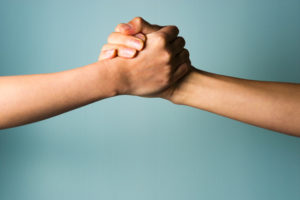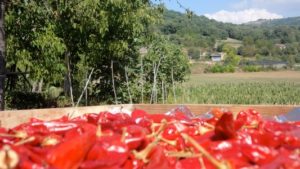
by Rita Fierro | Oct 18, 2019 | Italian blogs
“Cosa avete voi americani?” Un amico della Nuova Zelanda mi ha detto un anno fa: “Perché siete così resistenti a prendere in considerazione il bene comune?” Lo stato di panico attuale, fomentato da alcuni politici, e dagli atti di violenza, mi ricorda quel giorno.
Per questo blog sulle conversazioni inclusive, affronto la pratica di inclusione per il nostro bene comune. Le conversazioni inclusive sono definite come quelle conversazioni in cui le differenze sono viste come una risorsa, non una minaccia.
Cosa è il “bene comune?” E un qualcosa che riguarda tutti gli esseri umani in quanto tali. In questo momento, il panorama politico è diventato polarizzato perché la paura sta alla guida. La paura ci fa dimenticare cosa abbiamo in comune. La gente ci incita a diffidare degli altri offrendo un’illusione di protezione. Se solo potessi vivere in una scatola e proteggere la mia scatola, starei al sicuro. Basta fare una scatola più grande, più forte e con meno persone intorno. Svegliatevi. E’ un’illusione. Abbiamo dimenticato che gli esseri umani non possono vivere in una scatola?
Siamo umani, non possiamo vivere senza comunità.

Photo Credit: Louis Waweru
Sono una consulente per le organizazioni, ma anche una praticante ed insegnante di Reiki. Il Reiki è energia che favorisce l’equilibrio, la guarigione e il rilassamento del corpo. Aiuta ad alleviare dolori, ansie, stress e depressione. Negli ultimi 14 anni, ho trattato col Reiki persone in cliniche psichiatriche – per il recupero dalla tossicodipendenza e dall’ AIDS – in case per senzatetto e privatamente. Ho trattato: assistenti sociali e dirigenti, persone senza fissa dimora e professionisti, persone con problemi di salute mentale e il recupero dalla tossicodipendenza, vecchi e giovani, ricchi e poveri, repubblicani, democratici, indipendenti, gente di destra, sinistra e centro, formalmente istruite e non, veterani e pacifisti, negli Stati Uniti, in Nuova Zelanda, Europa e Africa. La gente generalmente viene da me perché le fa male qualcosa e farebbero di tutto per farlo passare, anche se non credono nel Reiki. Il Reiki aiuta anche la guarigione emotiva e la pace interiore, ma la maggior parte delle persone non pensano a questo all’inizio. Vogliono solo che la loro testa, le loro ginocchia, la loro schiena, la loro sciatica smetta di far male. Praticare il Reiki mi ha insegnato il bene comune.
C’è una cosa che so che tutti gli esseri umani hanno in comune: il desiderio di connettersi ed essere visti, apprezzati e amati. Quando tengo le mie mani su qualcuno laddove sentono il dolore, a volte vedo immagini come fotografie memorizzate nel loro corpo. Le mie mani diventano una camera oscura che permette a queste immagini di venire alla luce. Spesso, quelle immagini sono momenti di separatezza e isolamento. Un uomo fermato dalla polizia ha paura che la sua famiglia non avrebbe nulla da mangiare se lo rinchiudessero. Una madre e figlia dopo una lite. La vergogna dell’aborto, 50 anni dopo. Un vecchio amico si allontana dopo un’incomprensione. Un’amante sorpreso con qualcun altro. La polizia bussa alla porta di un immigrato.
L’immagine più frequente che vedo è quella di un rifiuto. La persona si sente esclusa o non amata, perché sente di non appartenere: a volte sono persone schizofreniche o schizoaffettive, alcolizzati o che fanno abuso di droga, senza tetto o mentalmente vulnerabili, Neri o sudamericani. Hanno quattro dita dei piedi o tre capezzoli, sono troppo grassi o troppo magri.
Come sociologa, è palese per me che l’aumento delle sparatorie e degli attentati negli Stati Uniti e nel mondo è legato a questo maggiore senso di esclusione e di paura. Durkeim nel 1897 lo ha definito anomia, questa è una delle cause sociali del suicidio. Durkheim ha detto che quando le norme sociali cambiano molto in fretta, come spesso accade nel mondo post-industriale, alcuni si sentono particolarmente sconnessi dalla collettività e alienati dalle nuove norme sociali. Si uccidono per reagire. Credo che attualmente il senso di esclusione è così alto per alcuni come individui, per altri come gruppo, che molti sono disposti a uccidere se stessi e gli altri per porre fine al dolore che sentono. Quindi, per me, è chiaro che la crescente violenza nasce dal dolore creato dall’esclusione, qualunque sia il posizionamento politico. Le persone ferite feriscono.
E’ così facile odiare questo o quel politico, questa o quella persona. E’ molto più difficile amare e parlare con il vicino di casa o un membro della famiglia al di là di qualsiasi diversità di opinione. Avere una conversazione e rimanere aperti di mente e cuore. Quando ci chiudiamo, facciamo male a noi stessi e preserviamo il senso di isolamento nel nostro corpo che diventa dolore. Mentre ci sforziamo per trovare accordi e soluzioni di lungo termine, non dimentichiamo che il più grande antidoto alla violenza è l’amore, il contatto e la comunità. Soprattutto quando il contatto e l’apertura richiedono coraggio. Quando ci sentiamo amati, accettati e uniti in comunità, la salvaguardiamo. Quindi quello che facciamo per il bene comune lo facciamo anche per noi stessi.
Le nostre armi sono troppo avanzate per quanto immaturi siamo le nostre capacità di amare. Noi diciamo “Ti amo” o “Ti voglio bene” ma si trasforma troppo facilmente in odio. E’ più difficile amare quando abbiamo paura, rimanere amorevole e aperti quando siamo arrabbiati, quando siamo terrorizzati. Non abbiamo altra possibilità per sopravvivere come specie.

Photo credit: Louis Waweru
E se ognuno di noi cercasse di avere una conversazione oggi qualcuno che ha opinioni opposte dalle nostre? Accettare il punto di vista opposto e ascoltare cosa li ha fatti giungere a quella conclusione? Che cosa succede se lasciassimo stare l’illusione della paura e ci concentrassimo sul bene comune? Le società che prestano più attenzione al bene comune sono molto meno violente. Dobbiamo investire nel nostro bene comune. La nostra sopravvivenza come paese e come specie lo esige.

by Rita Fierro | Oct 18, 2019 | Inclusive Conversations, Uncategorized
“What is it about you Americans?” a friend in New Zealand said to me a few months ago, “Why are you so resistant to the common good?” The state of panic, fomented by some presidential candidates, reminds me of that statement. Inclusive conversations are defined as conversations where differences are leveraged as a resource, not a threat. For this issue, I’m addressing practicing inclusion for our common good.
What is the “common good?” It is something that affects all of us humans as human. Right now, the political landscape has become polarized because it is fear-driven, it helps us forget that we have anything in common. People rush to push others away in order to offer an illusion of protection. If only I can live in a box, and protect my box, I’ll be fine. Let’s just make the box bigger, stronger, let fewer people in. It is an illusion. We have forgotten that human beings cannot live in a box. We are human, we cannot live outside of communities.

Besides an organizational consultant, I am also a Reiki practitioner and teacher. Reiki is healing energy that fosters balance and relaxation in the body. It helps relieve pain, anxiety, stress, and depression. In the past 14 years as a Reiki practitioner, I have treated people at mental health, recovery, and AIDS clinics, homeless shelters, and privately. I have treated: social workers and managers, homeless and professionals, people with mental health challenges and recovering from addiction, old and young, rich and poor, republicans, democrats, independents, socialists and anarchists, formally educated and not, veterans and pacifists, from the United States and other places in the world. People generally come to me because their body is hurting, and they’ll do anything to try to make it feel better, even if they don’t believe in Reiki. Reiki brings emotional healing and peace too, but most people don’t believe or care about that in the beginning of treatment. They just want their head, knee, back, sciatica pain to go away. Doing Reiki has taught me about the common good.
There is one thing that I know all human beings have in common: a yearning to connect and be seen, appreciated, and loved. When I hold my hands over someone where they feel pain, I sometimes see images, like photographs stored in their body. My hands become the darkroom for these pictures to come to light. More frequently than not, those images are moments of separation or isolation. A man stopped by the police terrified his family would have nothing to eat if they locked him up. A mother and daughter fighting. The shame of abortion, 50 years later. An old friend walks away after a misunderstanding. A lover surprised with someone else. The immigration police knocking on one’s door.
The most frequent image I see is that of rejection. The personal feels excluded, or unloved, because they feel they do not belong they:are schizophrenic or schizoaffective, alcoholic or drug user, homeless or mentally vulnerable, Black or Latino, have four toes or three nipples, are too fat or too skinny.
As a sociologist, it is so blatant to me that the rise in shootings in the USA and the world is connected to this increased sense of exclusion and fear. Durkeim in 1897, called it anomia, a social cause of suicide. Durkheim said that when social norms change too quickly, as they often do in the post-industrial world, some feel a sense of disconnect and alienation from societal norms, they take their lives to react. I believe that currently, the sense of exclusion is so high, for some as individuals, for others as a group, that many are willing to take their own lives and the lives of others to just be able to end the pain that they feel inside. So to me, it is clear that the rising violence originates from the pain of exclusion, whatever the politics. Hurt people hurt people.
It’s so easy to hate this or that politician, take your pick. It’s much harder to love and talk with your neighbor or family member on the other side of any controversial argument and have a conversation and stay open mind and heart. When we shut down we ultimately hurt ourselves, and store the sense of isolation into our bodies as pain. While we struggle to find legal agreements and long-term solutions, let us not forget the greatest antidote to violence is love, connection, and community. Especially when connectedness and openness takes courage. For when we feel loved, embraced, and connected in community, we safeguard it. So what we do for the common good benefits ourselves as individuals, too.
Our weapons are way too advanced for how immature we are at love. We say “I love you,” but can turn it quickly into hate. It’s harder to love when we are scared, stay loving and open when we are angry, when we are terrified. There is no other option for us to survive as a species.

What if each of us today took someone who has outrageous beliefs and accepted or listened to the story that gave life to them? What if we stepped through the illusion of fear focused on our common good? Societies that pay more attention to the common good are a lot less violent than ours. We must begin to value and invest in our common good. Our survival as a country and a species depends on our ability to learn how to do so.
Photo credit: Louis Waweru
ITALIAN VERSION

by Rita Fierro | Oct 18, 2019 | Inclusive Conversations
Many friends have talked to me about struggling with Facebook posts on their “friends’ ” timeline especially in this time of heated presidential debates and recent tragic terrorist attacks in Nigeria, Lebanon, Mali, Turkey, Ivory Coast, Belgium, and Pakistan. Some posts were prejudicial, others blatantly racist. The way Facebook is structured, someone’s status shows up on our feed, so many of us feel the need to “call out” misinformation and prejudice, and feel deeply disturbed when we choose silence. It is known that reacting to Facebook posts can create more trouble in relationships and friendships.
I believe in calling out prejudicial behavior during personal interactions. I value calling out injustice, because being silent also means being complicit. Speaking out is also an opportunity to begin an inclusive conversation: one where differences are seen as an opportunity instead of a threat.
But Facebook is another beast. I do a lot of thinking about this context before I step into the ring. Yet this concept of always calling out injustice, I believe predates Facebook. Since Facebook is not a face-to-face interaction, I found it rarely promotes genuine dialogue when people have divergent opinions. So in front of my Facebook feeds, I’m presented with choices of how to react: calling out or being silent. This is a false duality and we have other options:

- Assess the context: Am I trying to win an argument or am I coming from a place of curiosity? Who is this person and what is their relationship to me? How is my comment likely to be received? What are the advantages/disadvantages to commenting on someone’s wall? Would sending a private message be more effective? Am I/they likely to be/feel attacked; if so, have I done this before? How do I feel today? Am I in a space to be able to engage mindfully? I am capable of being completely present to the person I’m communicating with or am I frustrated about something else in my life and taking it out on them? Am I in a place where I can engage and freely let go if the conversation doesn’t go as I would like?
- 2. Call out: I can name the assumptions in a person’s discourse, their misinformation, the impact of their perspective on the world, the injustice, or the discriminatory effect on a targeted group. I could also just state: I disagree, and point out other points of view.
- Be silent: this option can range from withdrawing after I say my opinion to not saying anything at all. Is this the right venue for what I have to say? A friend of mine recently wrote under her FB post something I admired: “P.S. I have no interest in being part of any intense Facebook arguments. Happy to debate in person, but internet discourse can become hostile too quickly for my taste–perhaps because we cannot see each other’s faces. Just sharing my thoughts.”
- Ask questions: can I identify a question that will help me point at the default in the thinking? Can I ask a question that promotes real communication and inquiry?
- Post and article on my own feed. I can choose to be more explicit in my own personal stance by posting articles with my perspective. The other person might notice, just like I did, and maybe read it.
- Offer a reflection: I can invite the other person to reflect. This may be best done by me getting off my pedestal and offering an example of a time when I too, thought the same way or made the same mistake they are making.

- Use the misinformation in a different context. Sometimes the most awful things I see online, I can repurpose in a different conversation, article, lecture and/or training. When I use my moments of outrage as teaching moments for me, I can reflect deeper into why I think the way I do and gain a sense of empowerment by using the information in a different way.
- Deconstruct the thinking. Gain insight on another perspective, analyze it, debunk the underlying assumptions, and key inquiry questions so that when I’m in an actual in-person interaction I’ve done some pre-thinking about it. I make this choice often when the online situation feels like it would not promote real dialogue.
- Create other opportunities for dialogue that enable me to engage with people who have those opinions. If I’m dissatisfied with the need for real conversations around the issue, I can become more active in creating opportunities to engage in conversation in diverse groups. I can start anywhere, friends, religious community, neighborhood association, parent association, or activists. Chances are, my Facebook friend is not the only one with those opinions.
- Increase my capacity to continue dialogue in the cases of extreme differences of opinions. I can use my outrage as an opportunity to build my own capacity for real dialogue. I can attend some trainings, for instance that can help me build my capacity for having hard conversations. The following have been best for me:
- The Virtues ProjectTM helped me pay attention to someone else’s strengths while in the conflict, it gave me language to express appreciation, too.
- Art of Hosting taught me to stop controlling conversations, breathe freedom into them, and helped me find the courage to name what was really going on;
- Group Relations taught me what in my personal history was getting me locked into similar conflicts over and over again.
- 11. Establish relationships where I can be held accountable. No matter how progressive we think we are, there is always space to grow. This can be done by identifying a group of like-minded people with whom to build accountability to check my own ability to have open dialogue. Establishing ally relationships to have people I trust who can point out to me my underlying assumptions. These relationships can be a godsend especially when conversations go awry despite how hard I try.
I must admit that assessing the context (no. 1 above) with honesty and integrity towards myself and my motives, is always the best first step. When, instead, I dive right in with a solution, I’m often in a more vulnerable position of being hurt. And some days, like all of us, I still forget.

by Rita Fierro | Oct 18, 2019 | Inclusive Conversations, Participatory Leadership
In the last blog, I listed a self-care tip for having inclusive conversations: choosing when and where to invest your energy. Inclusive conversations are conversations where differences are seen as a resource instead of a threat. These conversations can be tricky because differences can bring up fear, hurt, or anger.
Today’s tip is also about self-care. If you’re not taking care of yourself in a conversation, or hosting yourself, and being present, as the Art of hosting’s four-fold practice would put it, then it’s unlikely that the conversation will be productive. Inclusive conversations are often hard and courageous conversations. So today’s tip: Look for allies and build support before you jump in.
I used to think I had to always speak out against any injustice, prejudice, and imperfection to be a worthy activist. Once, I was a member of a mixed activist group. The leadership was all white while most of the activists were African American. I demanded the leadership confront its own privilege and stop gatekeeping opportunities for a more diverse leadership. In a public meeting, designed just for this purpose, the leadership attacked me and attempted to taint my character. No one stood up for me. When I looked around the room, I was alone. I had no allies.
Two painful months later, one of the activists contacted me. “At the time,” she said, “I didn’t know what you meant by “gatekeeping,” but now I understand. Sorry I wasn’t ready to support you and stand up to the leadership.” See, she didn’t know because I had not built my support network. I learned from the experience that slamming my head against the wall of authority and power is not activism, it’s masochism. One is more likely to burn-out this way. It took me years to recover from the experience. I was scapegoated other times in a variety of groups, until I understood how scapegoating works and what I was doing to help it.

Scapegoating is a common group dynamic. When uncomfortable feelings arise in a group, there is a tendency to project those feelings against the person who inspired them. Truth-tellers are easy scapegoats because they say things that others try to hide. People who are very empathic are most susceptible to being scapegoated, because they can unintentionally take on the emotions of the group. By blaming the scapegoat, the group can avoid facing its own feelings of fear, discomfort, and hurt. Those feelings are projected to the scapegoat.
Scapegoating is not a right-wing thing, though we are hearing a lot of it in this presidential race. I’ve been scapegoated among conservative circles, liberal artists, radical hipster anti-racism activists, and preppy extra-educated psychologists. Scapegoating is everywhere. Just start noticing in any community how the gossip is concentrated against 1-2 people. Ladies and gentlemen, those are the scapegoats.
If you’re interested in knowing more about scapegoating and group dynamics, let me know and I’ll be happy to write more. Those of us who become scapegoats, experienced it first in our own families. A group relations conference helped me see this and set this painful experience to rest once and for all. But that’s a much longer story. For now, I just want to mention one easy tip.
Since I now know my tendency to be scapegoated, as soon as I enter a new group, I take some time to build relationships and get to know the people around me. I’m intentionally looking for allies. I’m intentionally building a support system for myself and others. I’m also learning what is perceived as “normal” in this group. I try to not step into conversations about power and privilege before I have a clear understanding of who this group is, how many people share my views, and who speaks truth to power and can offer me support.

Not pushing the envelope too soon has another effect, it helps me host the group, the fourth step in the four-fold practice, in Art of hosting terms. In other words, it helps me learn the group culture, see where the group is, get a sense of where it is going, and choose the most strategic time to make a controversial comment.
You think this is an easy cop-out? Think twice. Allies and timing are strategic. If a group is ready to be challenged and go deeper, it will be less willing to scapegoat you and your contribution can be more transformative. If you choose to oppose the larger group, doing it with allies by your side can be more effective because a group of people acting in unity are harder to scapegoat.
The newly arrived, isolated person who is quick to question what is normal for the group is the easiest scapegoat ever. These days, before I choose to do this, it better be worth it.


by Rita Fierro | Oct 18, 2019 | Antiracism, Inclusive Conversations, Uncategorized
Do your conversations these days feel like black holes of despair that transform even the sweetest of donuts into booger-tasting jelly beans? If most conversations you have about these crazy primaries end up in fights and go nowhere, tip #4 is for you. Inclusive conversations occur when differences are seen as a resource, not a threat. Previous tips included preparing the conversation, choosing when and where to invest your energy, opening the door to the conversation and making allies. Today’s tip is more about the actual conversation. Tip #4: No matter how insane you think people are to think the way they do, don’t beat them down with what you know, try to pause, and meet them where they are, instead. But before I explain what I mean by: “meet people where they are,” here’s a little story for you.
Sunday dinner, with my family in Italy and we’re discussing child prostitution. I was probably 20 years old. Yes, in my family this is what we talked about over Sunday dinner, along with everything else controversial, like war, politics, and inevitably, the corruption of the Catholic Church. The final cherry on the cake? The ethics and moral stature of our local priest. And this is where I got my Italian equivalent to what in the United States would be “debate team” training.
Here were our rules:
1) To get the stage, you had to yell louder and gesticulate bigger than everyone else.
2) Once you had the stage, you had 5-10 seconds to make your opening statement.
3) If your opening statement was persuasive, you could keep the stage for another minute, but only if you didn’t get distracted by the five people who were revving up their motors to jump in.
4) If your opening statement was weak, you would lose the stage.
5) If you paused, you’d lose the stage.
6) If you stuttered, you’d lose the stage.
7) If you had the stage for a whole minute, or two (which meant you were a pro) you had to have a final punchline to end your point to win.
8) If you lost, someone would interrupt you.
9) If you won, someone would interrupt you.
Brutal rules, I know. It was our bonding time. Bonding through fire. Our Sunday dinners were notorious for being loud. Even with the doors closed, neighbors on the street could hear us arguing. And Grandmom’s (Nonna’s) house is an earthquake-proof cement house in the open country-side and the street was a quarter a mile away. The men joked that they needed a traffic light to get a word in edgewise. We are a determined bunch of folks. We could run you down with words, any day, anytime of the week, just to be right. With this kind of training, I’m sure you’re not surprised that conflict in my family is an everyday affair.

Hot peppers (that my grandmother planted) in front of her house in the countryside. The road borders the property. The houses in the distance are on that road.
But back to the child prostitution dinner. “You have to persecute the men, because the men are the clients, and without them there would be no…” my aunt yells. “Go after the traffickers, you know the mafia is allied with those crappy politicia…” my other aunt interrupts. “It’s all the priest’s fault”, my uncle says, just to instigate the crowd. This is 15 years before the catholic sexual abuse scandals. The men in my family blame priests for everything. It is their weekly excuse for sleeping in on a Sunday morning instead of accompanying their wives to church.
An uncle who has been quiet so far and really hates the exponential volume of these conversations, finally screams: “What the hell do we care? Really? This doesn’t affect us!” Perhaps this was an ill attempt to quiet things down but I was livid.
“It’s that type of not-giving-a-damn-attitude that puts girls at constant risk…” I yelled. I listed every study on violence against women I could think of. I kept the stage for a whole two minutes. My heart was pounding as I was yelling at the top of my lungs. And then my last fatal blow:
“Let’s see if you care if it happens to your own daughter.” He was immediately offended and shut down. He got up and may have gone to the bathroom. Everyone else got up to clear the table. We dispersed. We moved on to talk about the mafia and the politicians’ role in everything that is wrong with our country. I’m thankful for my brother who said to me that day: “You’re right and you make good points, but your tone is so condescending no one will ever listen to you.”

The view of my grandparents’ land and tobacco fields.
A few years later, someone told me something very similar. We were having dinner at my place in Rome, with some of my African friends. We had a fiery conversation about the United States’ international imperialism. A dear friend said to me: “You know more than most people do about this stuff, but the way you talk, you push away people who could be allies, instead of helping them get curious to find out more.” That’s when it finally hit me. No one listens to what we say when how we say it makes them feel inferior.
After six years of college in Italy and six years of grad school in the United States studying the history of racism, discrimination, and exclusion all around the world, I had more material that most to offer a great, easy to win debate. Academia taught me to not win a debate by interrupting, but with logic: name the assumption your opposition is working from, display ample historical evidence that proves those assumptions to be wrong historically, move to how the historical evidence lives on today. Propose a solution. Final punch. It was a different tactic, but it created the same effect. There is a winner and a loser.
We are taught to debate this way in the academic world, it helps us establish credibility, prove we are qualified and gain self-confidence in what we know. But the systematic beating people down with evidence is not effective at helping people see another point of view or at making allies. Both parties in the conversation eventually walk away empty. The “loser” walks away feeling horrible about themselves. They also walk away feeling horrible about the world we live in. This person’s curiosity is not stimulated. The apparent winner may feel an ego boost at first, but eventually feels disconnected and alone, depleted by the conversation too.
Great teachers know that they cannot teach a student unless they know first, what the student already knows. New knowledge depends on pre-existing knowledge. Communication specialists will tell you that that unless you know what your audience cares about, you cannot communicate effectively with them.
So for today’s tip, instead of beating people down with the knowledge you have, try meeting people where they are. This expression is common so here are four ways I’ve learned to do this that I recommend:
- Find out what the person’s current knowledge is on the topic.
- Find out what the person cares about in other aspects of their life.
- Give up any false sense of superiority and talk to them as peers.
- Prioritize the message with very few points and relatable examples.
- Relate your key points to the topics the other person cares about.
- Ask questions, before, during, and after. The conversation is not over once you make your point. There is no touchdown scoreboard.
- No matter how much you think you already know, make sure you learn something from the other person too.














Recent Comments